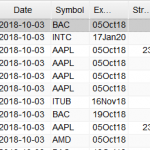An interesting article at Plaid Zebra cites work done at Harvard that says instead of believing that success leads to happiness, being truly happy is what leads to success with some data to back up the assertion.
I believe embracing this mindset can also pertain to the accumulation of assets as part of a retirement plan. There has long been a huge obsession with getting to “your number.” Investment and insurance companies have launched famous ad campaigns around this concept leading people to obsess over achieving their number and lamenting when they don’t or maybe feel with ten years to go they have no shot at their number.
If you want a $100,000 income in retirement you probably need a nest egg of $1.5 million which assuming the 4% rule would hopefully generate a sustainable $60,000/year which when then adding Social Security (depends on your particulars) could be close to $100,000/year.

How old are you (as an advisor, how old are clients)? Do you have a number, if so, what is it? How much do you have accumulated? Between now and when you think you want to retire how much more are you likely to add to your accumulation? Will that get you to your number? Some of that is knowable but some of it isn’t.
For many years in these posts I have consistently said that having a goal can be useful but your number, your actual number is what you end up with, not what a website or advisor told you 30 years ago. What you end up is with your reality. If you’re 66, have $788,000 and want to retire, then can you make that work? Great if you can but if you can’t then something has to give. Either you don’t retire, you downsize your lifestyle, or you take a middle ground of working one way or another in retirement.
In today’s dollars, could you get by on $5000/mo…if your mortgage was paid off and you were old enough for Medicare? How about less or more per month? That is what you need to figure and then back into covering that nut with Social Security, portfolio income, other income sources if you’ll have any and then finally some sort of earned income (monetizing a hobby, monetizing a volunteer endeavor, some sort of seasonal gig, consulting in your career field).













Leave A Comment